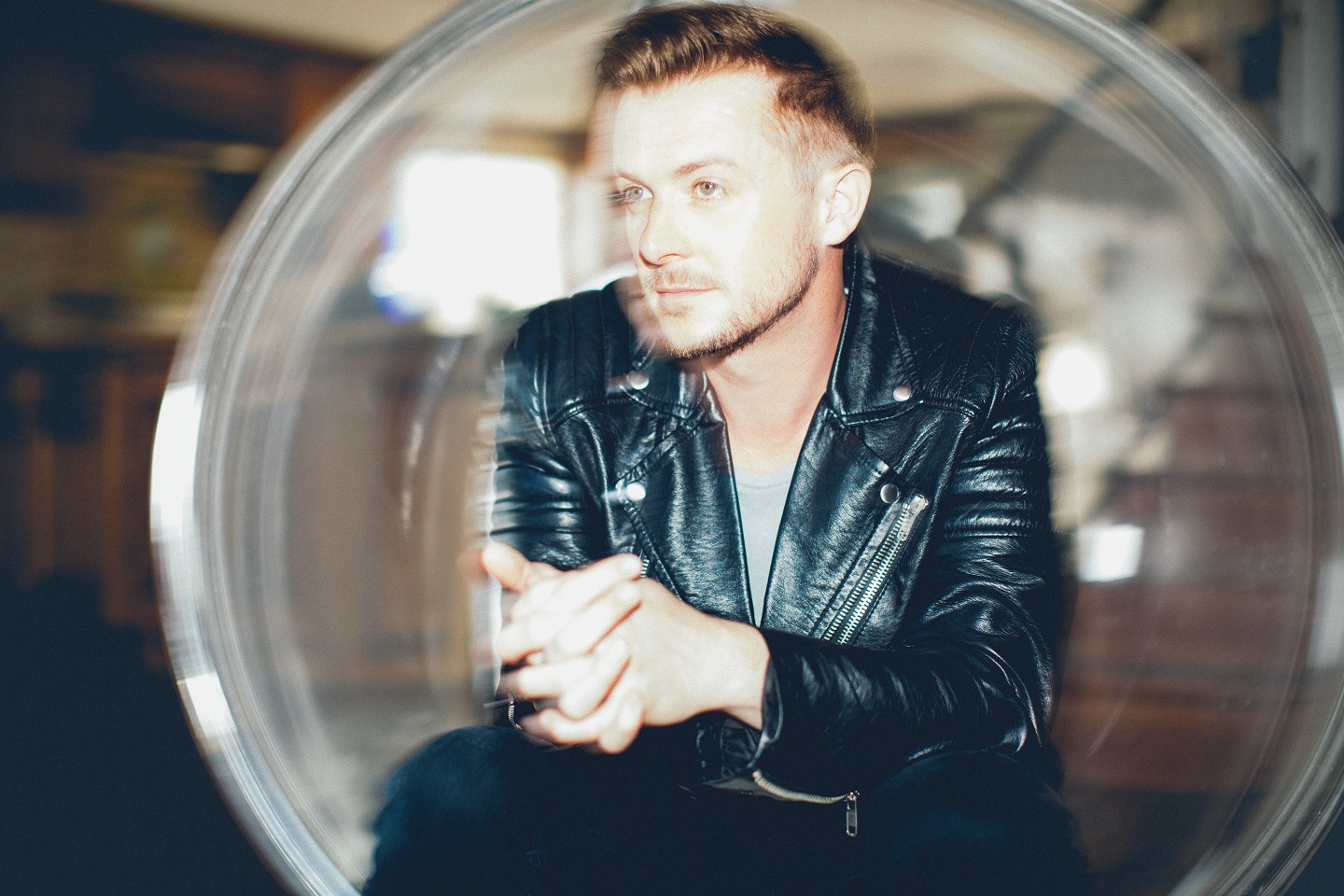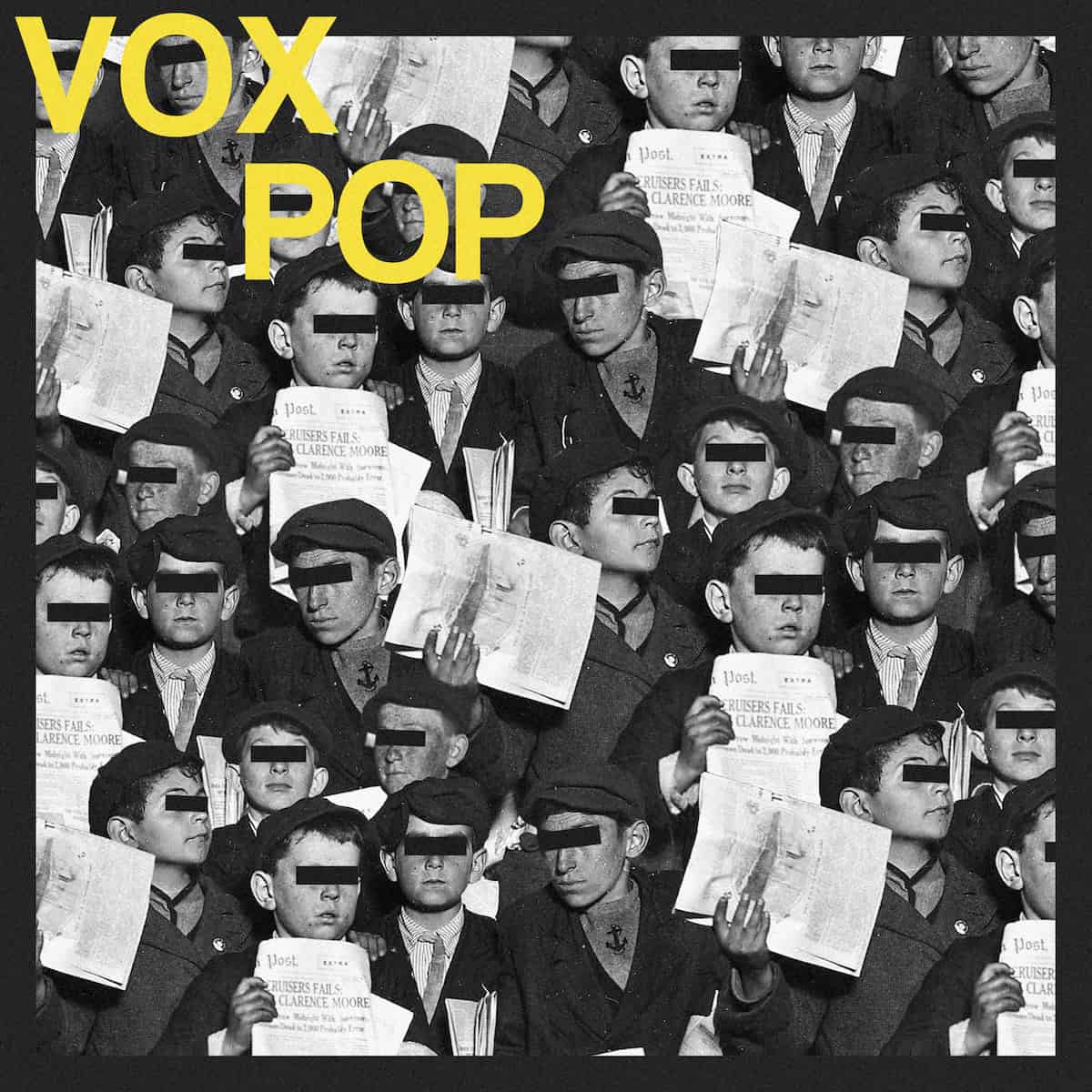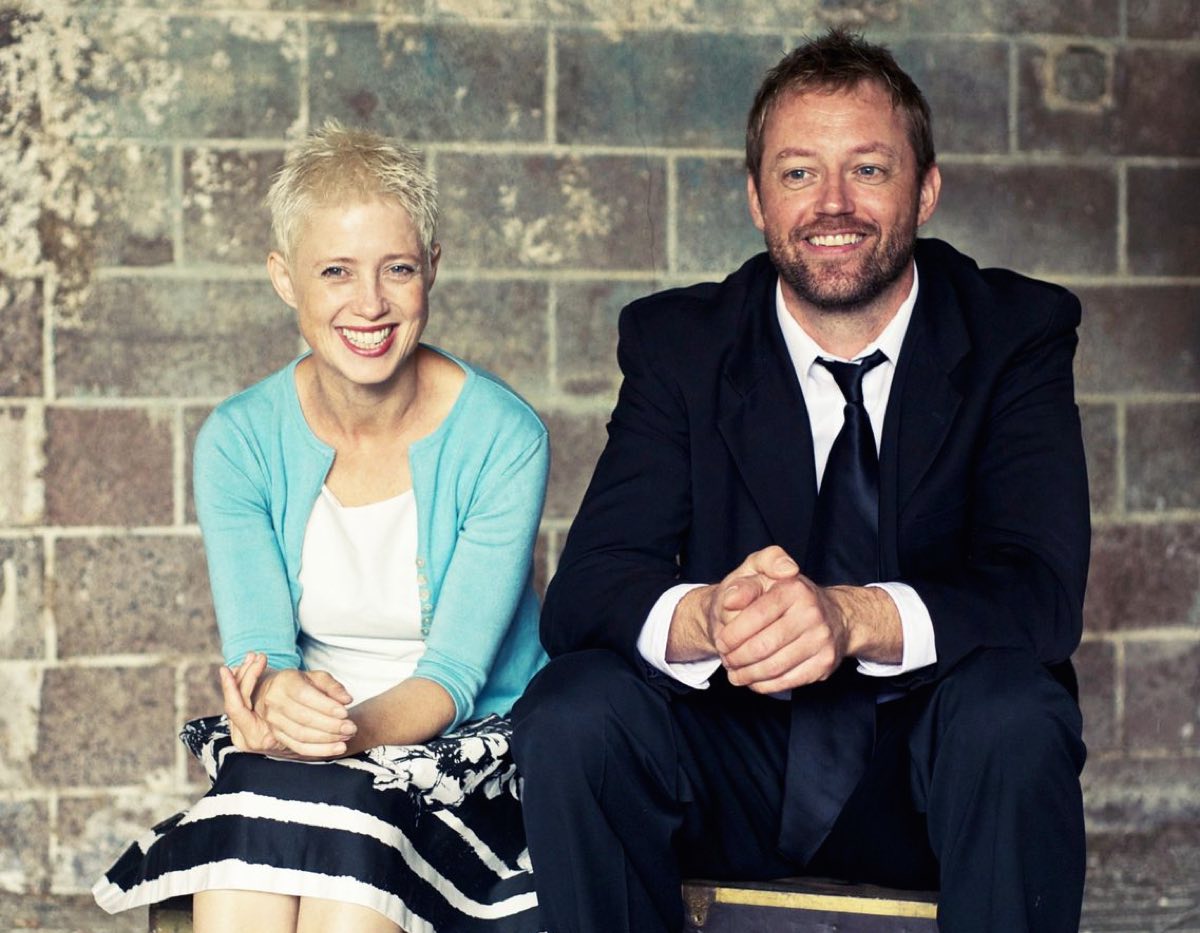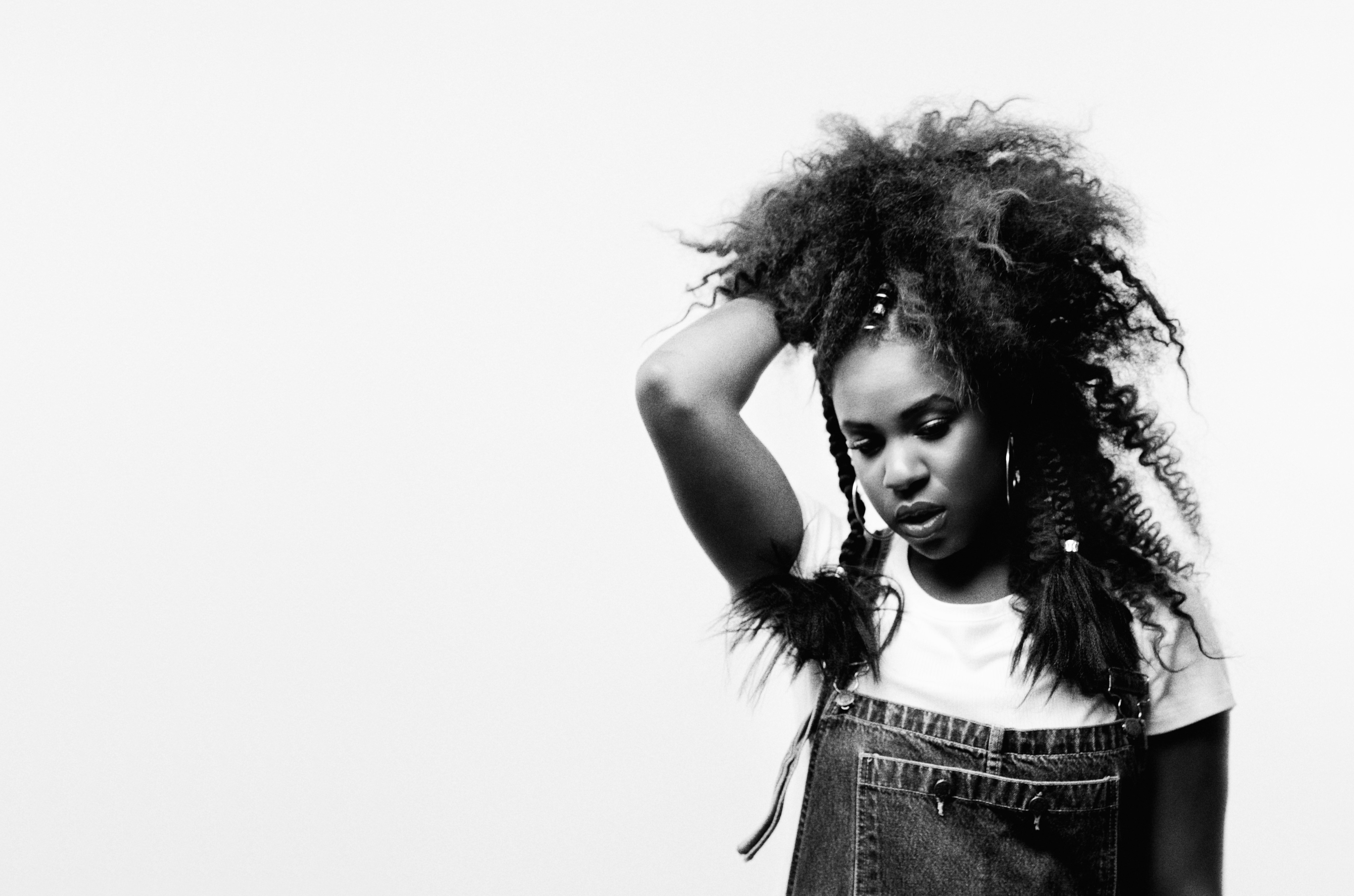Sisters Jessica and Camilla Staveley-Taylor of The Staves discuss their fourth album ‘All Now,’ an expansive, liberating, and irresistibly catchy record that finds the now-duo singing truth to power and wearing their hearts unapologetically on their sleeves.
Stream: “I’ll Never Leave You Alone” – The Staves
Jessica and Camilla Staveley-Taylor are ready for this moment.
They’ve been waiting for it for quite some time – and they’re prepared to shine. It’s been three long years since the release of The Staves’ last album, Good Woman, a painstakingly-crafted and critically-lauded record that never quite got its due onstage. Since then, their sister Emily formally decided to step away from the band all three Staveley-Taylor sisters had formed together over a decade ago, and the remaining two made the conscious decision to soldier on – going it alone, as a duo.
It’s uncharted territory for The Staves, but the pair adapted quickly – and their first record as a duo is one of the strongest releases of the band’s career.
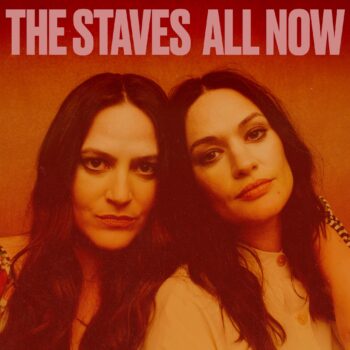
A product of passion and perseverance, soul-searching and self-knowing, All Now is an emboldened, cathartic release that sees The Staves basking in beautiful folk rock pastures as they take on the world, one song at a time. Released March 22, 2024 via Nonesuch Records and produced by John Congleton, the band’s fourth studio album is a spirited and expansive joyride filled with moments of light and love, grief and wondering, and that cheeky, biting English humor that, quite literally, kicks off the whole record with the simple, loaded phrase: It’s all now, isn’t it exciting?
It’s all now, isn’t it exciting?
We can stick it to the man
And come out fighting
Unencumbered, fast as lightning
I can act like I’m fine, I can put it in writing
It’s all now, isn’t it exciting?
Isn’t it exciting? Isn’t it exciting?
Isn’t it? Isn’t it?
– “All Now,” The Staves
From the unfiltered, cinematic title track “All Now” and the breathtakingly beautiful, achingly exposed campfire singalong “I’ll Never Leave You Alone,” to nuanced reflections on emotional overload (“I Don’t Say It, But I Feel It”), sisterhood (“After School”), love (“So Gracefully”), processing grief (“Recognise”) and everything else life throws our way (“Fundamental Memory”), All Now is utterly enchanting – a catchy, cohesive, and many-sided listening experience with endless returns.
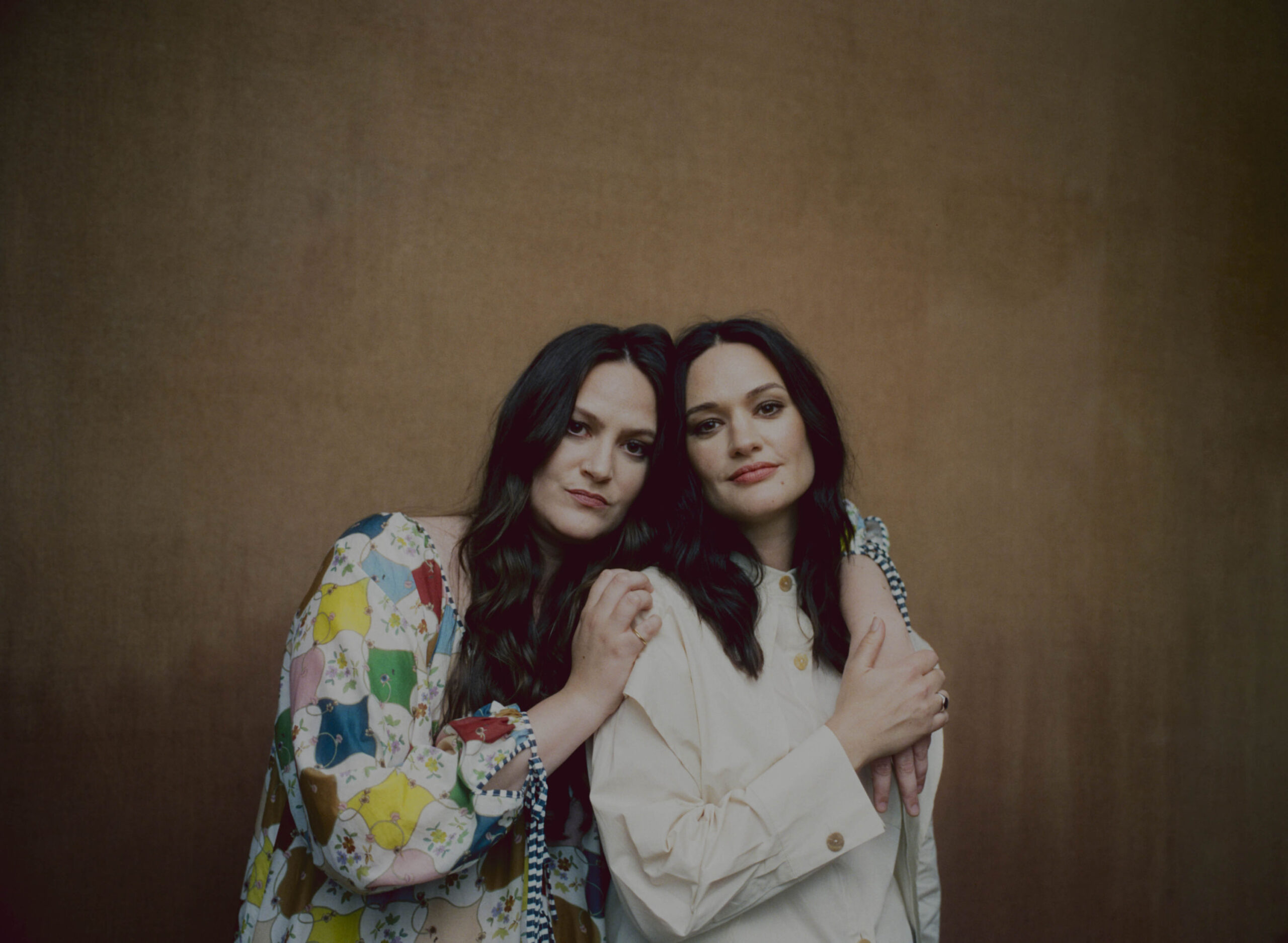
“It’s a very, very honest album,” Camilla Staveley-Taylor tells Atwood Magazine. “I think we’ve been wholly ourselves and it feels, I’m not trying to quote our song, but it feels exciting!”
“With these tumultuous times that we’ve been through, the questioning and the searching, what I feel good about with this record is that there is resolution in there as well,” her sister Jessica adds. “The track ‘You Held It All,’ that we decided to close the album with, there’s angst in that song about wrestling with yourself and your truth. It ends the album on a note of letting go and being confident and comfortable in speaking your mind, and basically being who you are. You will be okay.”
Atwood Magazine caught up with Jessica and Camilla Staveley-Taylor to discuss The Staves’ growth and evolution as a duo, their new album, and more: Dive into All Now in our interview below, and catch The Staves live on tour this spring and summer as they bring both Good Woman and All Now to a concert hall near you!
— —
:: stream/purchase All Now here ::
:: connect with The Staves here ::
Stream: ‘All Now’ – The Staves
A CONVERSATION WITH THE STAVES
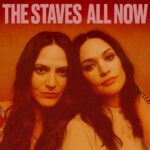
Atwood Magazine: All Now is such a special record in so many ways. How does it feel to be so close to having it out in the world?
Camilla Staveley-Taylor: It always feels surreal. Albums come out all the time, but being behind the scenes of it, at every stage of the story that’s happened, to make the thing, we’ve been there and lived it and done it all in real time, so it feels momentous.
Jessica Staveley-Taylor: Yeah. I think it’s all the emotions, it’s exciting, nerve-wracking, ‘bit scary, a bit surreal. Always. But I feel like it’s this every time you go around, whenever we go around… and yet, you still do it.
You're echoing a lot of similar emotions I heard you say three years ago – and I actually wanna take a step back there for a minute. Good Woman just celebrated its third birthday last month. What's your relationship with that album and with those songs nowadays? Has it grown over time?
Jessica: I think that with that record, there was such a buildup to that album that by the time we’d made it, I think we felt that we’d really said everything we had to say and purged emotionally. There was a lot to say and a lot had happened, and it also, it was the culmination of quite a few years. So, it felt momentous, that album, and I think because of the circumstances in which it was released, which were global pandemic times, surreal is the word, I’d come back to, it did feel a little bit like, we didn’t quite get a sense of how it had really connected or landed with people because we didn’t get to go out on the road very much at all, we did mostly did some UK shows and really not very many. So there’s like unfinished business with that album, I feel like, we’ve still got.
And the shows we did were brilliant, and that was our first time going out without Emily on the road, we had a new band, we were so excited, and we were like, this album’s gonna be like the one. And the shows were brilliant and our audience here in the UK and Ireland are amazing and they came out. But, I think we’d… It felt frustrating that that was it, because we’d hoped to go all around the world and take the message out there.
Camilla: Like cult leaders.
Jessica: I think that “unfinished business” feeling has probably stayed with us, and it’s one that you have to work out, how you wanna hold that thing, like is it a bitterness of like, “Oh, if only,” which I think a lot of people, especially in music have from that period of time that turned everything on its head? But it also feels a little bit like, in movies, there’s a revenge story, it’s like, this album is us seeking our revenge on the world.
Camilla: Like Kill Bill.
Jessica: “Well, we’re gonna come back with a new album, and we will tour. Just you see.” It feels like there’s more to prove with this record almost because we didn’t quite get the shot with that one.
Camilla: Yeah, ’cause I think that when we get to play live, for me at least, that’s when things feel real, because you make the thing in a bubble, in the studio, and you’re writing, and you’re really in your head, and you’re thinking about it a lot, and thinking about what it is that you wanna say, and then once you have that finished product, the reward is getting to go out and play the songs and live it, and have that communication with people, and be able to see what’s resonating more, or see people’s reactions, and it… Without that part being so present, it did feel like the old proverbial tree in the woods, of just like, “Okay, so it come out, that’s it? Oh, okay. All right. What now then?” So yeah, I feel an extra want to get out on the road with this one. Unfinished business…
Jessica: I think that trying out new music on the road is a really useful thing. You get to finesse songs and you get to see how a crowd reacts to it, and so with this record we have very much not done that ’cause we haven’t really had the opportunity. So it feels exciting and scary for that reason of, this is just gonna be completely brand new stuff that people haven’t heard.
What tracks from Good Woman still resonate?
Jessica: They all still resonate. I think playing them live has kept them alive in that way as well. From the way they evolve slightly through each tool, slightly different iterations happen. I feel like “Good Woman” itself and “Failure” always seem to slap when we play them live, they’re both really fun. And then “Best Friend.”
I hope that album gets its due – and I hope that comes for you this spring and summer. How, now, does All Now compare to Good Woman? Are there any salient through-lines, and where does your new record set itself apart from its predecessor?
Camilla: Well, it’s weird, we were talking about a similar thing… the song “All Now” feels like it’s a natural partner for the song “Good Woman,” or it feels like a continuation, let’s say. Because it’s dealing with similar feelings, similar subject matters on like, “Well, what am I supposed to be?” And lots of different pressures that life throws your way. But in terms of other, other themes and things like that, I think, there’s a lot of searching. And searching for the ability to be okay with searching, if that makes sense. And I feel like with this album, because comparatively to ‘Good Woman’, which was written over quite a long time scale, I feel like the themes in All Now, or the flavor of it, if you like, feels a lot more cohesive or crystallized, just because it was written over the course of a couple of years, which I really like, it feels very refreshing after the last one.
I wouldn’t change Good Woman – I love that album – but I think there’s something liberating about being able to commit to decisions and move on and not have to drag years and years and years of experiences and demos and ideas and things like that along with you. It can become a bit of a burden psychologically and emotionally, in all the ways really, artistically, it felt like once we got into our stride with this one, it felt simpler.
Jessica: Yeah. It was a fresh start in that way. And it’s the first record that we’ve made without having Emily involved from the beginning. She was still involved in Good Woman, in the making of it. So it was new, a little more distilled down, I think, in both those respects. And really, a new chapter or a fresh start, if you wanna call it that.
I do want to talk about Emily's departure a little. She sings on a few songs, right?
Camilla: Although she wasn’t involved in making the record, I think that we wanted to have her present, especially on certain songs that emotionally felt right. So she sings on “I’ll Never Leave You Alone,” “Echo,” and “Recognise.” Those ones felt like they were dealing with experiences and instances that were shared between the three of us, and it felt like we need to get her on this.
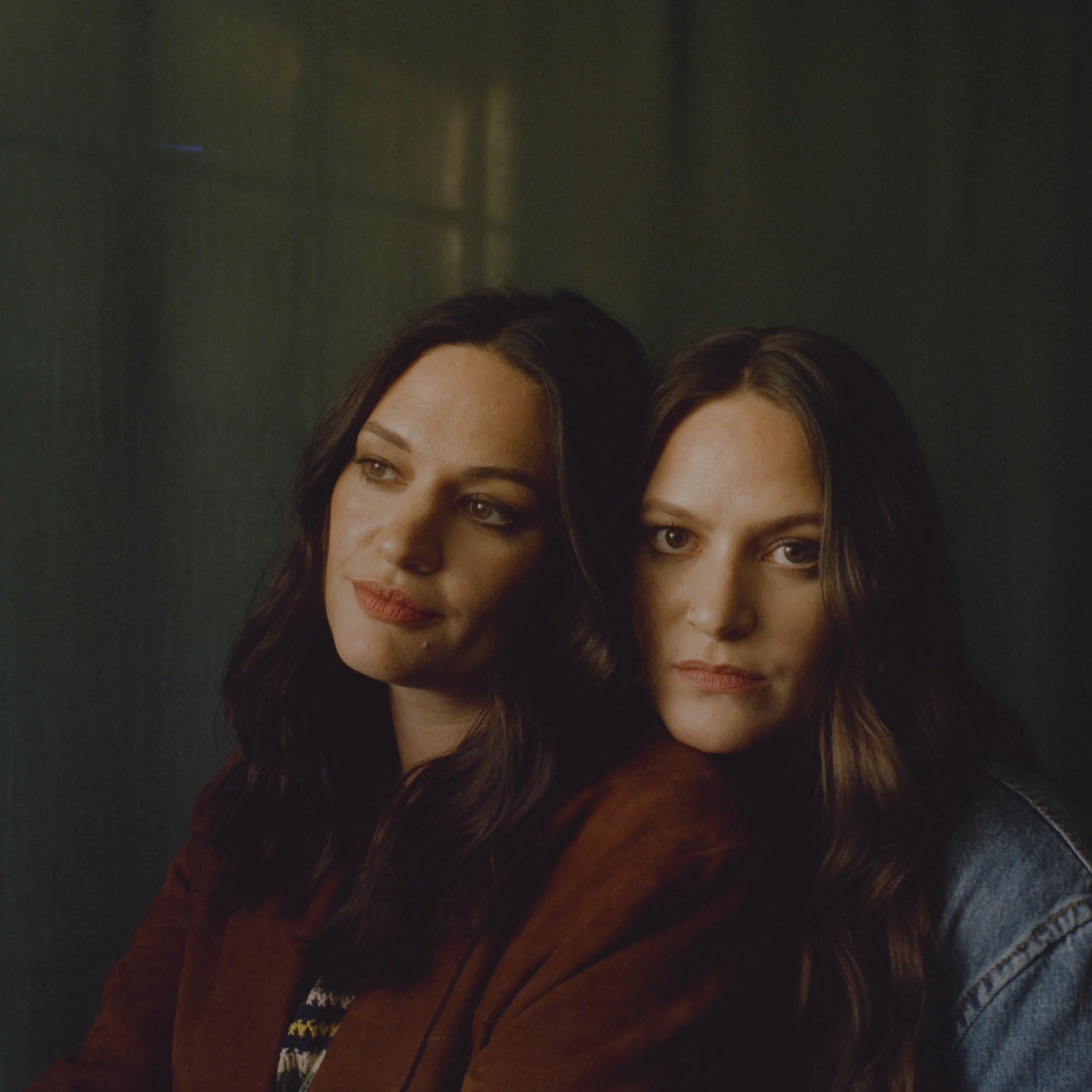
Did her leaving cause a bit of an identity crisis at all? Did that impact the making of this album? Was it a cause for a pause, or were you two comfortable charging ahead?
Jessica: I think there was a big pause. It’s not necessarily completely to do with that, but that was definitely a part of it. We’d already been out and touring without Emily and promoting Good Woman, so it wasn’t a brand new thing that we were processing. But I think that starting an album from scratch, and all the other transitions that have been happening in our personal lives, starting from scratch without her definitely felt like, “Oh wow, this is different now. This is another different thing that we haven’t done yet.” There was a period of not being hugely creative, and retreating a little bit after that record came out and after the touring had been done.
Camilla: Like I was saying before, because of it coming out and there not being an album cycle and a “campaign,” so to speak, I think we were just like, “What now?” We’ve just expelled all this emotion, all this stuff, just said it all, and then I think it felt a bit like there was this gap.
Jessica: “What do we do now?” When inspiration isn’t there, it can make you feel very powerless… The one thing you’re supposed to be doing, which is making music, if that’s not happening, then what is it you do and who are you?
Camilla: And what good are you?
Jessica: And what good are you? Should you get another job on the side? I think there was definitely a period of questioning and checking in, I think, with, “Well, should we make another album then or are we doing it because we feel obliged to, because that’s the trajectory that we are on?” And you’ve got contracts with record companies and things like that to think about. We decided ultimately that, yes, we did wanna pull John together and make a record. But I think it was good to question things, because for the first time since we started professionally making music, you just jump on the horse and it goes… And there’s a feeling that if you stop, to use another metaphor, like a shark in water, if you stop, it perishes. And you have to keep all the plates spinning and not let it all potentially feel like it might grind to a halt.
Camilla: You’re a passenger. You’re not really driving it.
Jessica: Well, it’s a mixture of all those things, isn’t it? And being a bit reactionary to things that are happening. Emily made a hug decision that meant stepping away from the thing that we’d done together for so long, and rightly so, as she should. So it was kinda like, “Have we got anything that we wanna do at the moment, do we wanna take a step back?” I’m going into a lot of detail here, but yes, I think that there definitely was a period of rethinking. And as cliché as it sounds, I feel that we ended up feeling quite simple, that actually it was just the music that brought us back to doing the thing, and the thing we were doing had always been because of the music, but it’s easy to forget that sometimes.
Camilla: Yeah, it is. And in that gap of feeling very uninspired and a bit spent with the last album, and feeling pretty down about not being inspired and all these questions. Yeah, questioning, I suppose a bit of an identity crisis, definitely. Personally, I think out of that, the forced re-evaluating of everything did prove to be a blessing in disguise, because we have been cognizant of every step of this, now, of writing and knowing that we’re doing this because we really f*ing love it, and we do have something to say, and really talking a lot, as well, me and Jess. We’ve never done this, just the two of us. Being forced to do all these new things, I think we decided to just run at it, and not really do an over-thinky thing, and just commit, and once we decided that, “Yeah, we do want to do this,” just being like, “Okay, let’s just do it really quick,” which was liberating.
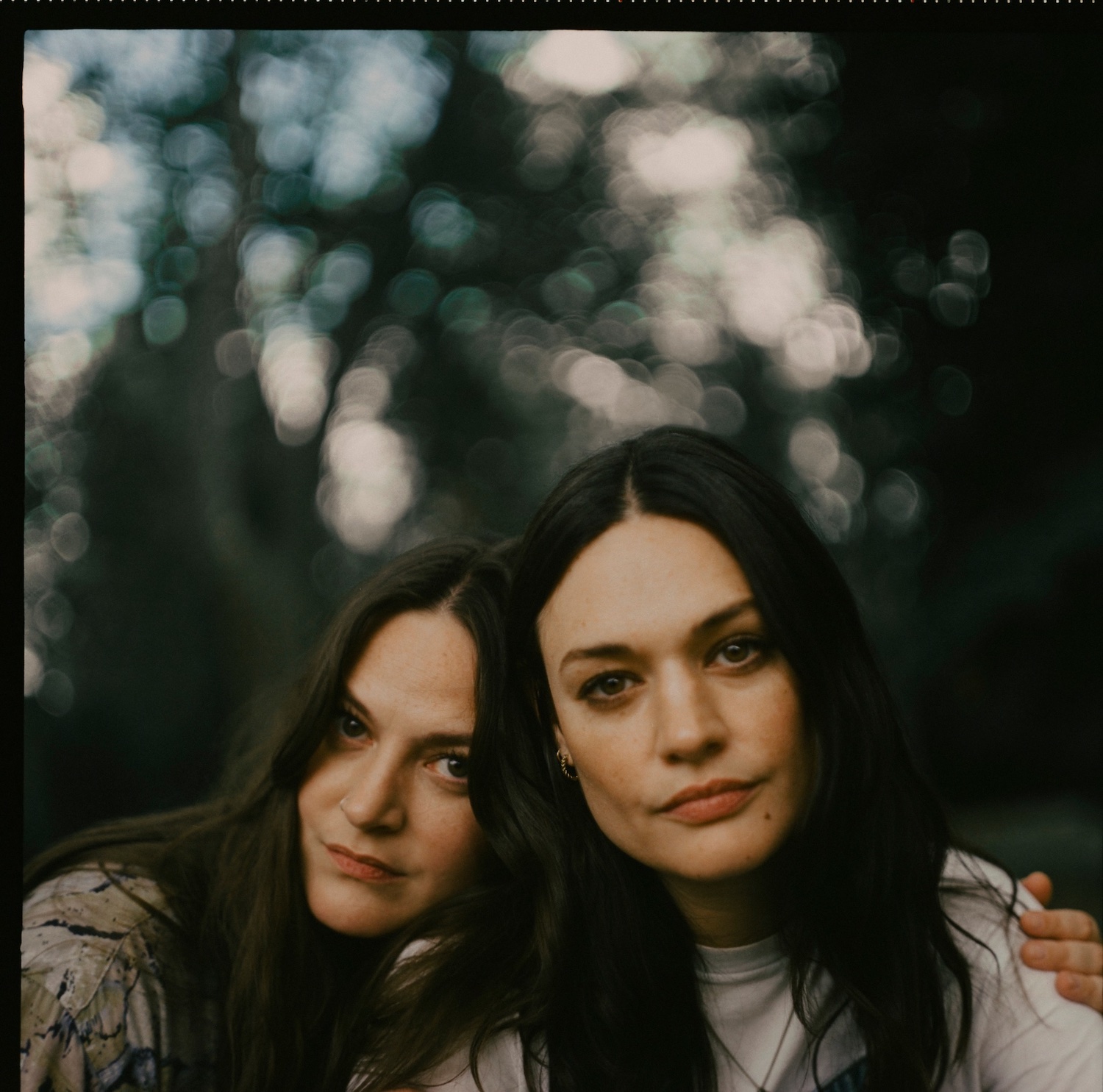
This brings us to the new album. Can you share a little bit about the story behind, All Now, what's special (or exciting) about it for you?
Camilla: I think it feels really representative of the band that we are now. We started writing it in a very stripped down way – we didn’t want to use the studio as a tool really, so we went back to how we first started writing together, which was trying to make sure that the songs stood up by themselves without lots of bells and whistles, and we wanted them to feel familiar to us, or something, like they’d always been. We had a clear idea of the ethos that we wanted to apply to everything, and we stuck to that. It’s a very, very honest album. I think we’ve been wholly ourselves and it feels, I’m not trying to quote our song, but it feels exciting! [laughs] It feels exciting, to me.
Jessica: We’re proud of all the songs, and they all feel that they have a reason to be there for sure. With these tumultuous times that we’ve been through and the questioning, as you were talking about, and the searching, what I feel good about with this record is that there is resolution in there as well. And the track, “You Held It All,” that we decided to close the album with, there’s angst in that song for sure about wrestling with yourself and your truth. We felt that it had a feeling to end the album on a note of basically, just let it go and be confident and be comfortable in speaking your mind and basically being who you are. And you will be okay. So I think that those themes run through it, of understanding oneself.
Camilla: And not torturing yourself. I sound very dark…
Jessica: I think there’s some fun on the record.
Camilla: There’s always a bit of fun, Jess.
Jessica: There’s always a bit of fun. I also feel that the songs are well placed, in that they all do a different thing from the other song. I don’t think there’s too many similar songs, which I feel good about. There’s a nice spectrum on there.
I thought it was interesting that you started the campaign with the last song on the album, and then the second song was the first song on the album. You began by introducing us to these two bookends.
Camilla: I hadn’t thought of it that way. It hadn’t even occurred to me. They just seemed like the natural introductions to what the new album is, but I suppose you’re right that, yeah, openers and closers, they are the cradle for the album.
What does the title All Now mean for you?
Camilla: It emerged partway through the album, that it should be the title track. But the song itself was born of feeling quite frustrated, and I guess it was maybe in the midst of the period of intense questioning and feeling a little bit lost, I suppose, and not really included in, I don’t know, not feeling like I was like everyone else or something. Feeling like a little bit of an outsider, and the pressure of how to express yourself, or really desperately wanting to express yourself – having a lot of feelings, but feeling like, especially with social media and how documented our lives are now, it feels like you have to share everything in a very specific way, and it’s not really enough just to be a person that feels something.
“Am I feeling sad right? Am I feeling happy right?” And if you’re suffering with something, does that mean that I have to, what, become a spokesperson for it, or a campaigner? It felt like I was being a bit overloaded with pressure – and pressure to be living my best life all the time, and like, “How great this modern world is” and “how far we’ve come.” And how woke everyone is, and how awesome everything is. And I don’t think things are that awesome. They’re still pretty f*ed.
Jessica: I think the song has got a tongue-in-cheek nature to it.
Camilla: Yes, so it’s supposed to be slightly sarcastic.
Jessica: Do you remember the show Party Down? Did you see that show, and do you remember that line, “Are we having fun yet?” It was the commercial he was in, and then that was used against him throughout the show, people being like, “Come on dude, say that line.” He’s the fun guy, and by the end he’s completely dead behind the eyes, like “Are we having fun yet?” And it reminded me of that as I was thinking about it. “Isn’t it exciting? Isn’t it? Isn’t it?“
Camilla: I know what you mean, someone shining a light in your eyes being like, “You’re empowered, aren’t you? Don’t you feel great? Isn’t it f*ing great?” And it feels not that different from all the shit that was wrong in the ’60s and ’70s, or ’40s and ’50s. It’s not moved on that much.
Jessica: Some of that inspired the music video, there’s this character in the video for the song who’s an evangelical salesman. In the video, the idea is he’s pitching some kind of big tech, could be Apple, or a school of thought, something vaguely, vaguely suspect, but familiar-seeming. We wanted to root our performance in the video in this ’60s, ’70s setup because, thinking about the hippie movement and peace and love, revolution being in the air, it was all this positivity and mania, but also ideologies that get corrupted and can turn dark. I think “All Now,” and, again, we were having fun with the idea, but we were also thinking about the many layers to those things, and I think we are being preached to a lot these days, whether it’s subliminal or very tangibly, f rom all directions. People in positions of power, it’s just anyone, everyone, constantly.
There’s a lot of noise, and we’re certainly not the only ones that feel that. Camilla I remember when you sent me the song, I was really excited ’cause this feels like a new beginning, this feels like something new. And I think having it as the opening track just made so much sense, but I also felt like this is just so you, the complete sarcasm and then just like, “I’m not f*ing doing that. F*k off.” It’s very, very you in a nutshell.
Camilla: Thank you.
Jessica: It emerged quite quickly and actually more the words as an album title emerged, and it felt, “Well, it’s happening now. We are in the present very much now.” We were really trying to let go of some of the past, I think, and just be capturing what was happening now and who we are now as a band, and so it was like, “Let’s let it lead the way.”
One thing I really enjoy about this record is that there are moments of cheekiness, even in moments of vulnerability. “I don't say it, but I feel it, is it because I'm English?” What a terrific line. Even where you're confessing to having all these pent-up emotions, you can still laugh at yourselves.
Jessica: I think it’s important for me.
Camilla: If you don’t laugh, you’ll cry. The cliché of Brits being a little bit more buttoned up is a cliché for a reason. We’ve spent a lot of time in the States and have a lot of American friends. We were talking about that song and about how many things you don’t even realize that you think every day, and they’re not spoken to anyone but yourself inside your head. And how many thoughts you have and how many memories you think about again and again and again, and how you feel about certain people and that you just don’t say, and we were just like, “F**ing hell, we’re English, aren’t we?” Recording in America as well with this album, I think it was highlighted, again.
Jessica: I think that song and “Fundamental Memory,” which is the next song on the record, are both trying to process… your mind is like a hard drive, it’s got all this information on it and it’s so hard to organize and store what’s in what folder, and get rid of what and which emails should you start, and whatever… And I find, sometimes I’m looking and I’m seeing zeros and ones like in The Matrix dropping down, and my mind is melting as I’m trying to wrangle it all into a way that I feel is working. Maybe that’s a wider theme in the record, thinking about All Now, and it’s like “system overload, no.”
“I Don’t Say It” was actually about these fleeting moments and passing moments, and the song was written on a train, and being in a car but seeing on railways the scenery whizzing by, it’s quite a physical example of that busyness and thought in your head and these fleeting things and like, “Oh yeah, I should do that, and da da da, and I should have told them that, and I meant to say that,” and it’s past and present and all these different things at once, so the song is a bit of a stream of consciousness. And that line is where it can land for a second and address the issue. It’s almost like stillness on the outside, but if you look inside there’s a lot of noise going on.
You have this song with the lines, “Fundamentally, you're in my memory, and that history, is still a part of me. In reality, well that's the closest thing to immortality.” And then you have “Recognise” later on in the record, which is a song about recognition – or lack thereof. “How can I get it back, who am I speaking to, what am I waiting for, do you remember, do you remember me?” I’d love to talk about that song. It’s one of the most heartfelt on the record for a number of reasons.
Jessica: We recorded that song completely live. It was the two of us and a guy called Max Hart who played the piano on that song. He actually played most of the instruments you hear on the album. He became a bit of a one-man band, and he’s a brilliant musician and a lovely person as well. I think we felt initially like maybe we should have him out of the room and we’ll just do a take and then have him come in and add to it, because the song did feel very personal, and I think we put off recording it during those sessions ‘til the very end. We just knew it was going to be hard, a difficult one to do. In the end we spoke to Max and spoke to John about what the song was about and it felt like we created a safe space to do it, and Max was completely the right person to have in the room with us. I think he was feeling everything that we were feeling, and it was hard, but I actually treasure that session as one of my favourite lasting memories of making the album.
The song is about grief, and it’s about reaching out into wherever to reach somebody, but it’s also examining the unfamiliarity with that distance and that time that passes and how grief is about the person that’s gone, but it’s also about what you’re left with and who you become. How you can feel that you’ve changed so much during that time, and are you even the same person that you were when you last knew that person. It was a song that took a U-turn, because the first verse came a couple of years prior on a completely different song we were working on. There’s a line about, “Can you bring me back to life,” and “light a candle,” and it was almost like a deathbed scene. At the time, we hadn’t written songs in ages, and it was the first jolt of inspiration at that point, but that was prior to us doing the album sessions… I think we thought the melody was cool, but it was a totally different song at that point, and a completely different arrangement, and we shelved it for a while, and somehow we returned to it during the All Now sessions.
Camilla: It was some time before, and it was one of those I’m really glad that we revisited, because sometimes you can just write off songs that don’t quite work and you don’t know if they have legs anymore, but occasionally you revisit them and decide to take them all the way back down to zero. Take everything off it and just play, just sit down and play the song together. The first time we did, we basically just did it like how we recorded it, and it felt like it was so much more representative of what the lyric is and what we wanted to say, and that intimacy…
Jessica: It was the simplicity that it needed that I think was because of the place we were in at that time when we made it. The original demo sounded like a Tudor song. Do you remember?
Camilla: Funny Nanny. I’d say more Fleet Foxes, but you can say Tudor. That’s fine.
The moment I heard that song, I connected with it. There’s so many layers to it, and it’s just so beautiful.
Camilla: Oh, I’m really glad that you connected with it in that way. Grief is grief, whether you’re suddenly saying goodbye to someone or saying goodbye to someone in slow motion, or however it’s happening, it’s all part of the same family, shared themes, feelings, everything.
Jessica: I think in that song, it’s also the disorientation that comes from those feelings of not knowing how and who and why and where and what.
Camilla: Yeah, feeling like a zombie.
Jessica: Yeah. But we must go forward with it. I don’t think there’s ever a point where it’s finished and it’s wrapped up with a bow and figured out, and that in itself is life’s journey, isn’t it? To learn how to live with it and watch it change and evolve over the years, and then you change and it’s like a new character that’s in the show now.
I've been pretty vocal about how “I'll Never Leave You Alone” has become one of my favorite songs that you've ever written. What does this one mean to you?
Camilla: Thank you so much. I wanted to write a song that we would’ve sung at a party with our friends, or one that we would’ve grown up with.
Jessica: The song wrote itself really quickly. It was one of those, which doesn’t always happen. I felt like it was there, and I found it or something. It really flowed out. I had the verses, or I had the verse ideas, and I wanted to have a really simple singalong chorus. The song has a campfire feeling; John called it cow-pokey, kind of country. It felt like something about the idea of many voices singing along a simple kind of, ooh, in the chorus… It felt like you are telling your tale, and then they’re joining in with like, “Yeah, yeah, yeah, we get it, we get it.“
Camilla: Lyrically it’s playing with lots of different adages and tales and sayings and things like that, which also makes it feel like an already shared thing, like more of a communal.
Jessica: The song has its own character, which I think is its own thing on that record. It was a really fun song to write for that reason – just leaning into all the instincts that came. It was the right way to do it. I think there’s a lot of fun in that song as well. I’m really glad you like it.
I could talk both of your ears off all day long about all these songs. What are some of your favorite tracks that we haven't talked about yet?
Camilla: Well, the “Great Wave” was so much fun to write and to record. It’s one that I think as it was happening, felt like “this is something that feels different from anything we’ve done,” and one that I think we are so excited to play live. It’s just really, really fun. That song lands at a midpoint in the record where all the undercurrents of questioning and yearning and searching and struggling, they come to a head with this song that deals with those things in more of a head-on way. For that reason, I really like it as well, of where it sits in the story of things, in the album, it’s that middle peak that you climb over that’s pretty scary and daunting, but pretty strong.
Jessica: I’m a big fan of making music where the sound of the music sounds like what you’re referencing in the song. There’s lots of ebbing and flowing and crashing and wave stuff, and it’s very satisfying to me.
Camilla: The other one I’d say is “After School,” because that song is a moment of joy on the album that’s really needed. And again, it was so much fun to make. We really just leant into having fun with it, leaning into classic rock elements with the production and the arrangement. It’s a nostalgic song and it’s a love story to Emily, really, to our big sister, through those childlike eyes or the lens of the sepia-toned childhood, looking up to your big sister. It was also a really nice way to have her included on the album in that way. I feel like it occupies its own spot that’s needed on the record.
Do you have any lyrics that continue to resonate with you from this record, that you're so excited to either sing or see people sit with?
Jessica: I think singing “You Held It All” is always really fun.
Camilla: I suppose on a personal level, I feel like we talk about a lot of things that we struggle with and things that are difficult, and our way of expressing them is doing this and making music. It’s really nice to write something about love and something that’s simple. So the song “So Gracefully,” I liked writing the lyrics in that about something that is simple, and everyone knows what that feels like. Those lyrics mean a lot to me.
Are you excited to get back on the road for your own headline world tour?
Jessica: We can’t wait. It’s been a long time coming. We just can’t wait to get back out on the road.
Camilla: It’s gonna be great. I think especially starting it all in the US and Canada as well, we’ve had the best time touring over there in our career. It’s been such a long time coming, and I’m so glad that it’s starting there. Rather than putting it off and waiting, it’s just like, “Let’s just go back and let’s do it.” It means that we get to play the songs, all the songs from the last record that we didn’t get to play as well.
What do you hope listeners take away from All Now, and what have you taken away from creating it and now putting it out?
Jessica: I feel genuinely incredibly grateful for anybody that listens to it. I mean, really people that seek it out and are interested and give their time. There’s so many records that I know that I should listen to. And I think, “Yeah, I’ll check that out.” And life has a way of getting in the way. So, for someone to take the time, and to go and buy the record, I’m just so, so appreciative, and I do really want them to enjoy it. It’s important that we’re happy with it, which we are. But it’s really important to both of us that our fans appreciate it. And I’d love to reach anyone that hasn’t heard us before. For someone that hasn’t heard us before, I would play them this record, rather than anything before. And I think that’s a good place to be in, with your album, to feel like, “I think this is the best stuff we’ve done.”
You’re a very insightful listener, and you ask great questions, you obviously pay a huge amount of attention, and I guess everyone consumes things in different ways and some people don’t really listen to lyrics and that’s fine. But I hope the lyrics resonate with people.
Camilla: Whether it’s what we mean in the song, or just what they take from it, I just hope that people take some sort of comfort or power or something from some of the songs, or feel like they can see an element of themselves in there.
Jessica: So often a very personal experience that feels like one that only you’re going through, when you speak about it, honestly, it connects with a lot of people that are actually experiencing something very similar. So I hope in that way that, it might reach somebody or empower somebody or just make someone feel… But really, music, listening to records and loving pop music for me since I was a kid, always made me feel less alone. If it could make someone feel that they’ve got some special place to go in this album, then I’d feel really, really happy.
— —
:: stream/purchase All Now here ::
:: connect with The Staves here ::
— — — —

Connect to The Staves on
Facebook, Twitter, TikTok, Instagram
Discover new music on Atwood Magazine
© Harvey Pearson
All Now
an album by The Staves

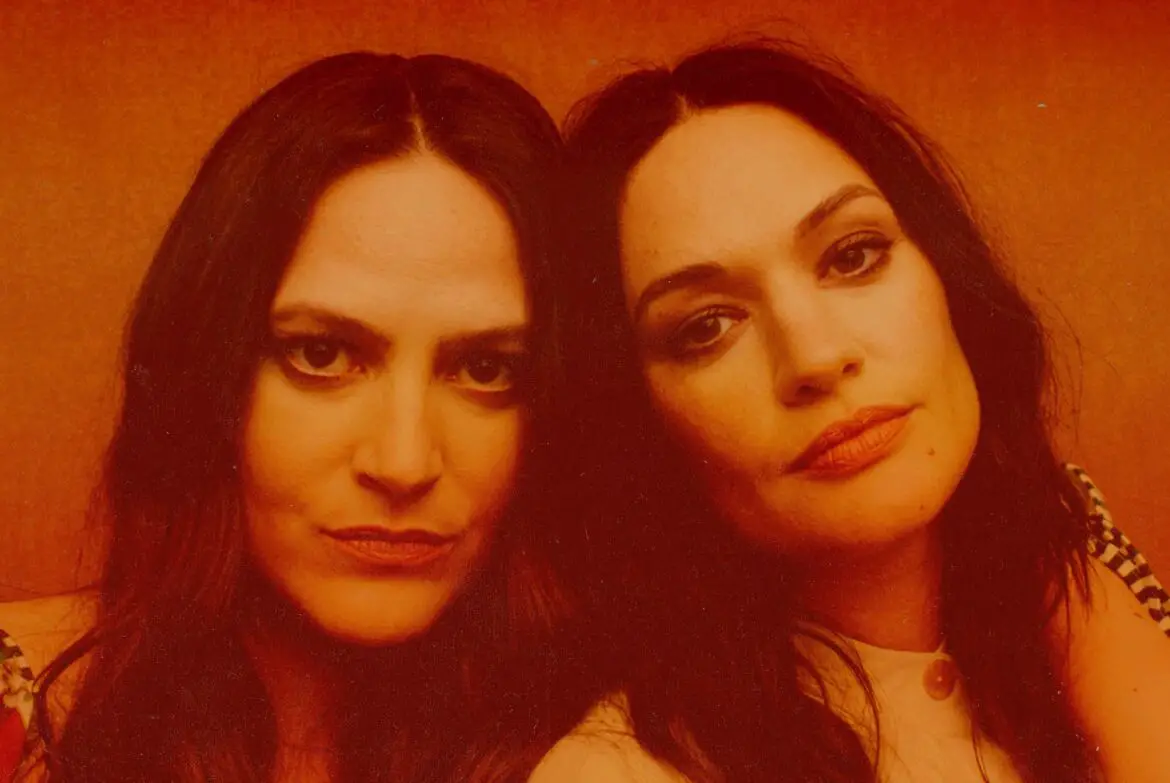
 © Harvey Pearson
© Harvey Pearson